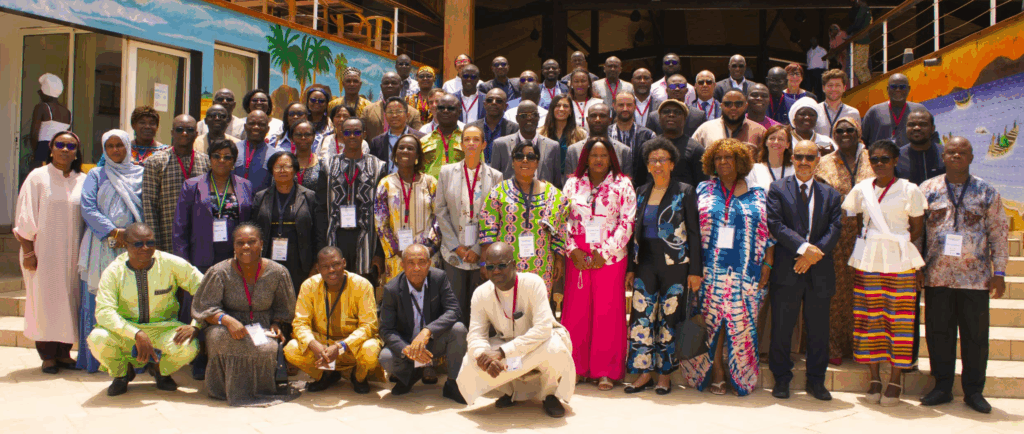Re-energizing nutrition financing in Francophone and Lusophone Africa: Time for innovation and action
Francophone and Lusophone African countries are at a critical juncture. Despite strong political commitments to nutrition, the region faces a triple burden of malnutrition: persistent undernourishment, rising rates of overweight and obesity, and widespread micronutrient deficiencies. This challenge is amplified in fragile and conflict-affected states, where instability and climate shocks exacerbate existing vulnerabilities. Nutrition expenditure reviews show a common theme of low prioritization of and expenditure on nutrition, as indicated by trends in Government and Donor Financing for Nutrition Across Regional Economic Communities in Africa in the nutrition financing brief.
A recent regional workshop in La Somone, Senegal organized by the Scaling Up Nutrition (SUN) Movement’s regional office for Francophone Africa and its technical partners, including FCDP/R4D, C4N, NPIN, and EU4SUN brought together policymakers, civil society, the private sector, and development partners from 17 SUN countries to collectively address the urgent need for innovative and sustainable financing for nutrition. The discussions were frank, the challenges were clear, and the need for action is now.

Participants at the recent nutrition financing workshop in La Somone, Senegal
Key insights and urgent calls to action
- National ownership is paramount: Participants emphasized the need to shift away from reliance on external aid and prioritize domestic resource mobilization. To truly empower countries, policymakers should increase national budget allocations for nutrition, explore innovative fiscal measures like taxes on unhealthy foods, and foster stronger collaboration between Ministries of Finance/Economy/Cooperation and nutrition stakeholders. Funders can play a catalytic role by supporting countries in developing and implementing sustainable financing strategies, focusing on building national capacity and ownership.
- Integration is essential: Nutrition must be integrated into broader development strategies, including climate resilience, humanitarian assistance, and peacebuilding. To achieve this, policymakers need to ensure that national nutrition strategies are aligned with sector plans in education, WASH, climate, and local development. Equally important, funders should prioritize funding for integrated programs that address the multiple drivers of malnutrition and promote cross-sectoral collaboration – see the Global Compact for Nutrition Integration.
- Financial tracking and accountability are critical: Weaknesses in budget tracking and accountability undermine the ability to make data-driven decisions that bolster the effectiveness of nutrition investments. To ensure resources are used effectively, policymakers should strengthen budget monitoring systems, improve transparency in resource allocation, and guarantee nutrition expenditures are tracked effectively to help monitor performance. Funders can support these efforts by investing in the development of robust financial tracking systems and promoting accountability for results.
- Climate and food system finance offer untapped potential: The potential of climate and food system finance mechanisms to support nutrition-sensitive agriculture, resilient food systems, and adaptation strategies is largely unrealized, representing a missed opportunity for innovative funding solutions. To fully leverage these opportunities, policymakers need to build capacity to access climate and food system funds, develop bankable projects that integrate nutrition objectives, and create enabling environments for private sector investment in sustainable food systems. Funders must simplify access to these financial resources for nutrition-related projects, provide technical assistance to help countries meet eligibility requirements, and prioritize investments that create synergies between climate, food systems, and nutrition outcomes.
- A stronger evidence base on social and economic ROI is needed: The Global Investment Framework for Nutrition states that for every $1 invested in nutrition, a return of $23 will be achieved. Notwithstanding, policymakers require a more context-specific evidence base demonstrating the significant social and economic returns on investment to secure increased and sustained investments in nutrition. Therefore, a combined effort from both policymakers and funders is required to invest in rigorous research that generates robust evidence on the cost-effectiveness and social and economic impacts of multi-sectoral nutrition interventions. This evidence must be meaningfully communicated to decision-makers to inform policy and investment decisions.
- Gender equity and youth inclusion must be central: Nutrition financing must prioritize gender equity and youth inclusion to be truly impactful. Women and young people, disproportionately affected by malnutrition, are also key drivers of change. Policymakers should invest in strengthening their leadership and participation, while funders can support inclusive financing models that embed gender and youth in program design, particularly in fragile and conflict-affected contexts.
The way forward
The La Somone workshop was a critical step in re-energizing the nutrition agenda in Francophone and Lusophone Africa. Now, it’s time to translate these insights into concrete actions. We urge policymakers, funders, and development partners to:
- Enhance efforts to mobilize domestic financing for nutrition, taking into account national contexts and fiscal space. This implies governments allocating additional funding to nutrition specific and sensitive expenditure, to enhance efforts to better mainstream nutrition into plans and budgets, and to strengthen the level and design of fiscal instruments such as Sugar Sweetened Beverages (SSB) taxes.
- Embrace innovative financing mechanisms and build sustainable systems for nutrition. This includes actively seeking to unlock different types of financing, and more specifically, climate and catalytic financing mechanisms such as the Green Climate Fund (GCF), Global Environment Facility (GEF), Global Financing Facility (GFF), African Development Bank (AfDB), Global Agriculture and Food Security Program (GAFSP), and the Child Nutrition Fund (CNF).
- Strengthen collaboration and coordination across sectors and with development partners.
- Hold ourselves accountable for results and track progress towards achieving nutrition targets.
Your contribution is essential to ensuring that all people in Francophone and Lusophone Africa have the opportunity to reach their full potential through good nutrition. Your comments, ideas, and recommendations are welcome.
Lisez ce blog en français ici.
FCDP is a SUN Movement resource available to all 66 SUN Countries. The platform aims to transform the nutrition financing landscape by inspiring and igniting government leaders to elevate nutrition financing as a priority and accelerate impact across sectors.













